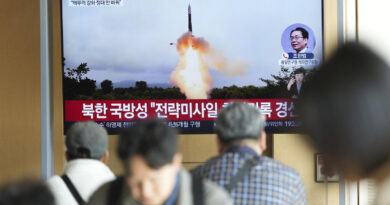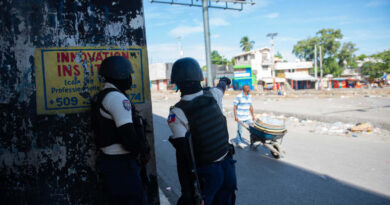Remains of teen U.S. soldier identified 74 years after he went missing in Korean War
The remains of a teenage soldier who was killed in action during the Korean War have been identified after nearly 75 years, U.S. military officials said Thursday.
U.S. Army Pvt. 1st Class Arlie P. Barrett, 19, of Bluff City, Tennessee, was a member of the Easy Company in August 1950, according to a news release from the Defense POW/MIA Accounting Agency. On Aug. 10, 1950, he and his unit engaged in “combat actions” with the North Korean People’s Army along the Naktong River near Yongsan, South Korea.
Defense POW/MIA Accounting Agency
After those actions, Barrett was deemed missing in action. Fighting in the area was intense and kept the military from recovering his body at the time. The circumstances of his death remain unknown, the DPAA said. He was listed as presumed dead in December 1953, according to an archival news clipping shared by the DPAA. He received a Purple Heart for his service.
Several months later, in December 1950, a set of unknown remains was recovered from a village about eight miles from where Barrett was deemed missing in action. The remains could not be identified at the time and were buried as unknown in the National Memorial Cemetery of the Pacific in Honolulu, Hawaii, and his name was recorded on the Courts of the Missing there.
In November 2000, a memorial service was held to commemorate Barrett, according to archival news clippings. At the time, his sister, Ruby Barrett Fleenor, said that she had submitted a DNA sample to military officials that she hoped would lead to the identification of Barrett’s remains.
In June 2021, the remains found in December 1950 were disinterred and brought to the the DPAA laboratory, where researchers combine technology, research and more to try to identify unknown remains. The techniques used included dental and anthropological analysis, a radiograph of the chest of the remains, and mitochondrial DNA and mitochondrial genome analysis. Researchers also used circumstantial evidence to determine the identity of the remains.
On June 7, 2024, the remains were identified as Barrett’s.
To commemorate his identification, a rosette will be placed next to his name on the Courts of the Missing. He will be buried in Mountain Home, Tennessee on Sept. 27, 2024. His funeral will have full military honors.
Barrett is one of more than 450 Americans who were killed in the Korean War whose remains have been identified and returned to their families since 1982, according to the DPAA. Over 7,500 Americans remain unaccounted for from the war, the DPAA said.






